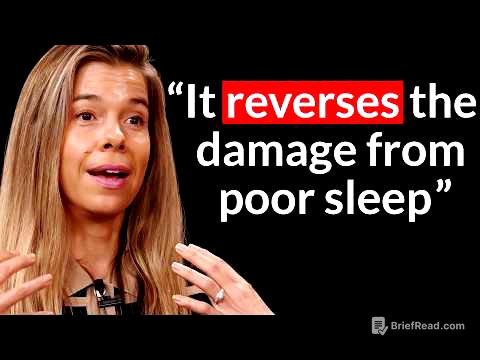TLDR;
This episode of Behind the Diary focuses on strategies for success in both career and content creation. It emphasizes standing out from the crowd by using high-signal communication channels and crafting high-impact messages using the RICE framework (Reward, Ideology, Coercion, Ego). The episode also highlights the importance of consistency, learning from data, and playing the long game in content creation, alongside insights into building a strong company culture and finding exceptional talent.
- Standing out requires using high-signal channels and high-impact messages.
- Consistency and learning from data are crucial for content creation success.
- Company culture is defined by behavior, not just stated values.
What 60,000 CVs taught me [0:25]
Having reviewed 60,000 CVs, the speaker shares insights on what makes a candidate stand out. He identifies key elements that capture attention and differentiate individuals from the mass of applicants. The speaker aims to provide viewers with actionable advice to improve their chances of getting noticed, whether applying for a job, seeking investment, or simply sending an email.
The viral job hunt tragedy [1:00]
The speaker addresses the disheartening trend of job seekers, like a girl who applied for 600 jobs before landing one, struggling to find employment despite having qualifications. He views this as a systemic issue, emphasizing the need for effective strategies to help qualified individuals get noticed and secure roles.
Forbes Top Creators list reveal [1:18]
The speaker discusses Forbes' list of the highest-earning creators worldwide, using it as a springboard to share advice for those aspiring to grow their social media following. He plans to detail the essential steps to take over the next 5 to 10 years to potentially join the ranks of top-earning creators.
What to do if you want to join that list [1:36]
The speaker promises a detailed session on how to become a top-earning creator. He outlines a plan of action for viewers who aspire to achieve significant growth on social media and potentially earn a place on the Forbes list in the future.
The most important role we’re hiring for [1:48]
The speaker announces the hiring of a Head of Happiness and Health, emphasizing the importance of this role for maintaining company culture as Flight Story grows. He notes that intentional effort is required to preserve a positive environment with a larger team.
How 1 candidate stood out from 16,000 others [2:08]
The speaker introduces Harry Walsh, who was hired as the Head of Happiness. He highlights how she stood out from 16,000 applicants. This serves as an example to illustrate the speaker's framework for effective communication.
The message that landed her the job [3:14]
Harry emphasizes the importance of aligning company culture with finding individuals who can perform their best work. She views her role as creating a new standard for how people perceive and enjoy their work. Harry aims to reduce the speaker's direct involvement by fostering ideological alignment within the team.
A simple framework to get your message seen [3:58]
The speaker introduces a framework to improve the chances of getting a response when sending a message or email. The framework involves two axes: the medium used for contact (high signal vs. high noise) and the impact of the message (high impact vs. apathy). High signal mediums are less noisy and more direct, while high impact messages are emotionally resonant.
The difference between noise and signal [4:58]
The speaker elaborates on the difference between high signal and high noise channels. High signal channels are rarely used, less noisy, more likely to be opened, direct, and emotionally disarming, such as sending a letter. High noise channels are saturated, often filtered or ignored, and easier to dismiss, like a generic email to a recruitment inbox.
What a high-impact message looks like [5:58]
The speaker contrasts high-impact messages with those that evoke apathy. He uses Harry's application as an example of a high-impact message, noting that she sent a personalized video explaining why she was perfect for the role. This message was sent through a high-signal channel, bypassing typical recruitment methods.
What Harry actually sent us [6:45]
The speaker introduces the RICE framework to help viewers craft high-impact messages. RICE stands for Reward, Ideology, Coercion, and Ego, representing the four basic motivations that drive people. Understanding these motivations allows one to connect what people care about with what you want them to do, increasing the likelihood of a positive response.
The key question that got her the job [7:58]
The speaker explains the four components of the RICE framework in detail:
- Reward: Anything someone wants, such as money or recognition.
- Ideology: The beliefs that guide a person's actions.
- Coercion: Using negative motivations like guilt or shame.
- Ego: How a person views themselves, including their desires and self-image.
Celebrating our investment win [8:38]
The speaker celebrates Perfect TED, a matcher company they invested in, for being recognized as the fastest-growing founder-led company. He plans to congratulate the founders and have a late-night business chat with them.
A late-night founder chat [9:00]
The speaker discusses the challenges of balancing ambition with personal relationships. He notes that the drive for success can strain relationships due to time constraints and stress. The conversation touches on the importance of finding time for romance and managing stress to maintain personal connections.
Inside Flight Story: bank holiday hustle [10:30]
The speaker showcases the dedication of his team, highlighting Cristiana working hard on a bank holiday. Cristiana outlines her tasks, including responding to new leads, managing the commercial pipeline, and forecasting revenue. The conversation reveals the company's confidence in achieving its financial goals.
Why we’re struggling to hire great people [11:10]
The speaker discusses the difficulty of finding and hiring top-tier talent despite receiving thousands of job applications. He emphasizes that the company seeks individuals with specific skills, mindset, commitment, and entrepreneurial spirit.
Are we spending enough time on hiring? [12:04]
The speaker questions whether the company is allocating enough resources to hiring, considering its importance. He suggests that more effort and investment are needed to find and nurture A-players, aligning resources with the stated value of exceptional talent.
How to recruit the best: our secret weapon [12:27]
The speaker suggests recruiting more people who fit their prototype, expanding beyond current recruiters. He acknowledges the need for a dedicated team focused on finding the right candidates.
Ask your team this hiring question [13:25]
The speaker shares a strategy for hiring exceptional people by asking team members who the best person they've ever worked with is. He explains that exceptional team members often know and have worked with other exceptional individuals, making this a valuable source for recruitment.
The truth about finding A-players [13:50]
The speaker emphasizes the difficulty and time-consuming nature of finding great people for a company. He acknowledges that hunting for these "unicorns" requires a significant investment of time and effort.
Is mental health the price of success? [18:06]
The speaker reflects on the relationship between mental health and success, suggesting that prioritizing mental health might hinder achieving high levels of success. He shares personal experiences of pushing through discomfort and suffering to gain a competitive advantage.
Suffering as a competitive advantage [19:11]
The speaker argues that the ability to consistently endure unhappiness and do things one doesn't want to do is a significant advantage. He believes pushing through discomfort year after year is a key factor in achieving long-term success.
My weekly ritual for measuring success [21:47]
The speaker mentions a ritual of reviewing podcast numbers every Tuesday morning to gauge the success of new episodes. He admits that poor performance can negatively impact his entire day, highlighting the emotional connection to the podcast's performance.
Why you must embrace the long game [22:24]
The speaker emphasizes the importance of playing the long game and detaching from short-term results. He advises learning from bad days and enjoying good days, but maintaining perspective and realizing that no single episode is fatal.
Final thoughts & reflection [23:39]
The speaker reflects on the challenges of maintaining care and effort over long periods. He acknowledges that there are moments where others might give up, but persisting through these hurdles is essential for lasting success. Building a team, culture, and mentality that supports longevity is crucial for overcoming emotional tolls.









